ENA - ENA English
Headlines
Diplomatic Community in Addis Extends Timket Best Wishes
Jan 19, 2026 823
Addis Ababa, January 19, 2026 (ENA)—Embassies in Addis Ababa have expressed their "Happy Holiday" messages in honor of the Timket festival, which holds great significance for the followers of the Ethiopian Orthodox Tewahedo Church. Various embassies based in Addis Ababa have extended their best wishes to the Ethiopian people on the celebration of Timket. Millions of Ethiopian Orthodox Christians gathered across Ethiopia today to celebrate Timket, the Ethiopian Orthodox Epiphany that commemorates the baptism of Jesus Christ in the River Jordan. The three-day religious festival, one of the country’s most significant public events, has been observed with vibrant spiritual and cultural ceremonies in cities and towns nationwide. The Russian Embassy in Ethiopia highlighted the spiritual significance of the day. The mission expressed its hope that the holiday brings peace, health, and joy to all households. The United States Embassy also conveyed its congratulations to the Ethiopian Orthodox Tewahedo community. In its message, the Embassy stated, “As Ethiopian Christians commemorate Epiphany both in Ethiopia and around the world, the U.S. Embassy extends warm wishes for joyful and festive celebrations. Melkam Timket.” Similarly, the Embassy of the State of Israel to Ethiopia and the African Union extended its greetings, stating, “The Embassy of the State of Israel to Ethiopia and the African Union wishes all Ethiopian Orthodox Tewahedo followers a happy and blessed Epiphany!” The Embassy of Armenia in Ethiopia shared its sentiments, noting, “Embassy of Armenia in Ethiopia sends its best wishes for a blessed holiday to all Ethiopians celebrating Timket - Happy Epiphany! Melkam Timket!” The United Kingdom’s diplomatic mission expressed its desire for a celebration defined by delight and communal cheer, while the Canadian Embassy wished for a day of joy, peace, and festivity. Other diplomatic missions, including those of Germany, the Netherlands, Sweden, Finland, and Pakistan, joined the international community in honoring the Great Epiphany. Furthermore, the United Nations office in Ethiopia extended its wishes for a peaceful and joyful holiday. The UN recalled that Timket was inscribed by UNESCO as an Intangible Cultural Heritage of Humanity in 2019, recognizing its profound cultural and spiritual resonance on the world stage.
International Visitors Participating on Timket Laudes Splendor of Ethiopian, History, Culture, Hospitality
Jan 19, 2026 523
Addis Ababa, January 19, 2026 (ENA)—International visitors participating on Timket/ Ethiopian Orthodox Epiphany /laudes the splendor of Ethiopian, history, culture and hospitality. Millions of Ethiopian Orthodox Christians across Ethiopia celebrated Timket, the Ethiopian Orthodox Epiphany that commemorates the baptism of Jesus Christ in the River Jordan. Visitors from around the world, have also gathered in Ethiopia to celebrate Timket, the Ethiopian Orthodox observance of Epiphany commemorating the baptism of Jesus Christ. In an exclusive interview with ENA, Reverend Bronson Woods from Atlanta, Georgia highlighted Ethiopia’s historical and cultural significance. ‘…, this is our second time coming to Timket, to really engage in the culture and the ritual of this great coming together. It's not as cold this year as it was a couple of years ago. It's been excellent. We've had a wonderful time.’ He also called the world to come see the beauty of Ethiopia. ‘I encourage the world to come to Ethiopia to experience the beauty and the essence of God's Holy Spirit.’ Mentioning about the history of Ethiopia, the reverend said, “Ethiopia is the only uncolonized country on the African continent, It’s a powerful symbol of resilience. You also see harmony here Christians and Muslims living together with respect.’’ LeahRose Monterra, American tourist from California, also described her first impression of the country as breathtaking. ‘‘I just think it's breathtaking. It's beautiful. All of these people coming. It's beautiful.’ She also likes the weather. “The weather is amazing. The green trees, the culture it’s breathtaking,” Monterra said. She also said the people are humble, kind, and welcoming, adding that Ethiopia offers far more than what is often portrayed online. Alexandria Van Hook, visiting from San Francisco, described Timket as a powerful spiritual experience. “This celebration reminds us that God has been revealed,” Van Hook said. “Even if you don’t understand the language, you can feel the spirit of prayer. I feel renewed, blessed, and deeply grateful.” “I feel unity, love, and victory here in Addis Ababa,” she added. “Please come. Be present. Be mindful.” Dustin Penrod, from Los Angeles, said the warmth of the Ethiopian people stood out from the moment he arrived. “Everyone greeted me with smiles,” Penrod said. Penrod noted that Timket was unlike any celebration he had previously experienced. “Seeing generations from children to grandparents celebrating together, people who don’t even know each other, all sharing joy, it’s beautiful,” he said. He said the celebration is something people need to experience for themselves. Also attending the celebration was Suzy Park, a nurse from South Korea visiting Africa for the first time. “I’ve never seen a ceremony this big before,” Park said. “The Ethiopian people are so kind and friendly.” Park also took part in a traditional Buna (coffee) ceremony, which she described as unforgettable. “It was amazing,” she said. “I want to tell my friends about Ethiopia and Addis Ababa, and I hope to come back again.”
Timket’s Unique Spirit and Cultural Wealth Captivate Tourists
Jan 19, 2026 563
Addis Ababa, January 19, 2026 (ENA)— As the colorful Timket (Ethiopian Epiphany) rituals unfolded at Jan Meda in Addis Ababa, tourists praised the celebration as a profound expression of faith and culture. Marek Dague, a first-time visitor, told the Ethiopian News Agency that witnessing Timket exceeded all his expectations. "Ethiopian Epiphany is so beautiful, amazing, and interesting," he said. Dague called on international media to visit the country and reflect its diversity and heritage. “More international media need to come and visit Ethiopia and see what a beautiful country it is with beautiful people, all the culture, languages, scenery and history,” he noted, adding that Timket itself deserves global recognition and preservation. Reflecting on the atmosphere at Jan Meda, he said, “You look around, see what's happening, see the people with their smiles, see how everyone is dressed nice. The passion that they have for their religion is amazing.” He added that he and his friends traveled across much of northern and eastern Ethiopia and were deeply impressed. “We observed a lot and we were very happy with what we saw,” he said. On Addis Ababa, Dague described the capital as a beautiful and engaging city, highlighting Merkato, Piazza and Bole. He said he was interested in everything he observed during his stay. Another tourist, Sofiane Gabriel, described Timket as “very interesting and unique,” noting a strong sense of spirituality throughout the country. “Compared to Europe and the rest of the world, people here in Ethiopia are really close to God and close to religion. We can feel this energy everywhere. It's really impressive,” he said. Gabriel said his journey took him across several regions. “We crossed almost half of Ethiopia. We visited Amhara, Tigray, Afar and Oromia. Everywhere we went, it was incredible. People are very hospitable. They talk to us friendly, invite us to coffee and food. So it is unforgettable, a human experience,” he stated. He emphasized Ethiopia’s cultural preservation. “Everywhere you go, you can see people with traditional clothes, costumes and people doing ceremonies. The culture is super well preserved and rich,” he said. Describing Addis Ababa, Gabriel said the city reflects both calm modernity and hope. “Addis Ababa is a really calm city, really modern, and it reflects the future of Ethiopia, a bright future. At the same time, it reflects the energy of the people,” he added. He was particularly struck by the scale of public participation. “Large people in the street we couldn't ever see in my life. I can feel people have passion when they sing, when they meet, when they eat,” he said. Jean Baptiste, an associate professor of social anthropology at a university in Paris who frequently visits Ethiopia, said attending Timket in Addis Ababa allowed him to discover a new dimension of the country. “I knew very well the southern parts of Ethiopia. I stayed in Addis only a few times, so this is my first time attending Timket here,” he said. He explained that the celebration offered insight into Ethiopian Orthodox life. “I am discovering the Orthodox Church that lives its life in Addis Ababa and I find it wonderful,” he noted. Comparing the experience with Europe, Baptiste said, “In France, we mostly have this kind of ceremony inside the churches. Unlike Ethiopia, we lost a bit this practice of doing procession and public ceremony in an open space.” He added that the celebration offers valuable learning for visitors. “I am discovering the Orthodox Church and I can compare the same faith with differences from the Catholic Church. That should be part of what tourists could also observe,” he suggested. Baptiste concluded that Timket leaves a lasting impression. “The faith of the people is impressive and the visual impression too. It is really crowded with all this white, the umbrellas and everything. That is really impressive,” he said.
Religious, Cultural Values Anchor National Unity: Minister Shewit Shanka
Jan 19, 2026 377
Addis Ababa, January 19, 2026 (ENA)—Ethiopia’s religious, historical, and cultural values are the bedrock of its multinational unity and the pinnacle of its national identity, remarked Shewit Shanka, Minister of Culture and Sport. The Minister shared these reflections amidst the vibrant and spirited Timket celebrations at Jan Meda, Addis Ababa. The grand occasion was graced by Abune Dioskoros, Secretary General of the Holy Synod alongside archbishops of the Ethiopian Orthodox Tewahedo Church. Joining the festivities were Addis Ababa Mayor Adanech Abebie, members of the diplomatic corps, Sunday school students, and a vast gathering of the faithful and international tourists. Shewit noted that Ethiopia remains a paragon of multinational harmony, beautifully adorned with a tapestry of diverse identities and faiths. She described these shared values as "Ethiopia's multinational jewels"—the very forces that inspire the people to stand in unwavering solidarity whenever the nation’s sovereignty is tested. Highlighting the festival’s global resonance, Shewit observed that Timket has transcended borders to become a cherished world heritage, captivating the hearts of travelers from every corner of the globe. The Minister expressed her deep gratitude to the Ethiopian Orthodox Tewahedo Church for its vital role in preserving the authentic religious and cultural essence of the festival through the centuries. She concluded with a call to the public, noting that such celebrations should inspire a renewed commitment to collective efforts for the peace and prosperity of the nation. Timket is far more than a religious observance; it is a living testament to Ethiopian civilization. Since antiquity, the tradition of the Tabot, the sacred representation of the Ark of the Covenant—leaving the sanctuary to be among the people has symbolized the profound intimacy between the divine and the community.
Addis Ababa’s Renewal Elevates Timket Celebrations, Says Mayor Adanech Abebie
Jan 19, 2026 459
Addis Ababa, January 19, 2026 (ENA)—Addis Ababa’s ongoing transformation into a cleaner and more vibrant capital has created a welcoming setting for major religious and cultural events, strengthening the city’s appeal to both citizens and international visitors, Mayor Adanech Abebie said. Speaking during the grand Timket (Ethiopian Epiphany) celebrations at Jan Meda, the Mayor noted that the festival vividly reflects Ethiopia’s rich cultural diversity and deep-rooted spiritual heritage. She described Timket as a powerful symbol of renewal and revelation, calling on Ethiopians to mark the occasion by reinforcing unity, solidarity, and mutual respect among the nation’s many communities. The Mayor emphasized that the city's enhanced beauty and cleanliness have made it increasingly attractive to international visitors. She further highlighted that the seamless coordination between the administration and religious institutions has become a driving force for the city’s ongoing developmental initiatives. Since its inscription by UNESCO as an Intangible Cultural Heritage of Humanity, Timket has increasingly drawn the world’s attention to Ethiopia, becoming a premier annual destination for global travelers. Timket, the Ethiopian Orthodox celebration of Epiphany has been observed with unwavering devotion since ancient times. Commemorating the baptism of Jesus Christ in the River Jordan, the festival is a breathtaking display of faith that radiates from every corner of the country.
Politics
AU Pushes for Unified Mediation to Revive Eastern DR Congo Peace Talks
Jan 18, 2026 1016
Addis Ababa, January 18, 2026 (ENA)—African and international leaders have agreed to consolidate all mediation efforts under an African Union (AU)-led framework to address the protracted conflict in eastern Democratic Republic of the Congo (DRC). The decision followed a high-level, two-day summit in Lomé, chaired by Togo’s President Faure Essozimna Gnassingbé, the AU-mandated mediator for the Great Lakes crisis. Leaders endorsed a unified mediation structure, including the creation of an Independent Joint Secretariat to support the AU Panel of Facilitators, which includes former presidents from Nigeria, Kenya, Central African Republic, Botswana, and Ethiopia. The summit called on all parties to implement existing peace commitments, prioritize political dialogue over military action, and resume negotiations under the Doha process with the Congolese government and the M23 armed group. Leaders also welcomed prior diplomatic efforts, including U.S.-brokered agreements between DRC and Rwanda and the Doha Declaration and Framework Agreement, while highlighting the Paris Conference on the Great Lakes as a milestone in mobilizing international support. In a statement on X, Gnassingbé emphasized that only a coordinated, durable political solution can restore peace, security, and stability for the Great Lakes region. Violence in eastern Congo has persisted for decades, displacing millions and making it one of Africa’s most enduring humanitarian crises.
Nat'l Dialogue Enters Final Phase after Inclusive, Successful Process, Says House Speaker
Jan 18, 2026 966
Addis Ababa, January 18, 2026 (ENA)—Ethiopia’s national dialogue, which has involved all segments of the society, has reached its critical and concluding phase, according to House of People’s Representatives Speaker Tagesse Chafo. Established by the House of People’s Representatives under Proclamation No. 1265/2022, the Ethiopian National Dialogue Commission is an independent institution with the mandate to conduct inclusive dialogue aimed at resolving Ethiopia’s fundamental differences of ideas and disagreements. The Commission is working to build a national consensus by conducting broad-based and inclusive public consultations on fundamental national issues. In this regard, it has successfully carried out identifying participant and agenda-collection processes on major national matters suitable for dialogue, and has now reached the final stage of the process, the Speaker noted. He told the Ethiopian News Agency that the National Dialogue Commission is conducting an active dialogue process with the meaningful participation of Ethiopians who are deeply concerned about national issues. According to him, the Commission has been carrying out successful work across regional states, city administrations, and the Diaspora by collecting agendas and identifying participants for the main dialogue process. He noted that a wide range of stakeholders, including civil society organizations, university instructors, and other segments of society, have taken part in the dialogue process. As a result, this is a unique and successful consultation process in which Ethiopians contributed ideas that they believed serve the best interests of their country. Speaker Tagesse further stated that a clear methodology has been designed to implement and guide the final phase of the dialogue, and called on all stakeholders to fulfill their responsibilities so that the remaining work can be completed successfully. As issues related to history, law, and governance can be addressed through dialogue, the national dialogue presents a crucial opportunity to do so, he added. Speaker Tagesse has called on stakeholders in Tigray region to actively participate in the ongoing dialogue process and play their role in ensuring its success. Ethiopia is a country endowed with great potential and resources, he noted, emphasizing that Ethiopians can achieve remarkable outcomes through dialogue, discussion, and mutual understanding. The House of People’s Representatives has been providing continuous support for the national dialogue process, beginning from enacting laws and establishing institutions that closely follow its day-to-day activities. The Speaker finally affirmed that the government is ready to implement the outcome of the dialogue that represents the will and decision of the people.
Ethiopia Essential BRICS Partner that Brings Rich Experiences in Various Spheres: Indian Ambassador
Jan 18, 2026 1177
Addis Ababa, January 18, 2026 (ENA)—Ethiopia is a very important BRICS partner that brings a lot of knowledge and expertise in all aspects of the BRICS activities, India’s Ambassador to Ethiopia, Anil Kuma Rai, told ENA. Recall that India has assumed the BRICS chairmanship on 1 January, 2026. In an exclusive interview with ENA, the Ambassador said Ethiopia is a very important partner of BRICS that brings a lot of knowledge and expertise in all aspects of the BRICS activities. The agendas for the year are to promote innovation and to create an ecosystem where the developing countries have their own way of dealing with things, he added. As a major developing country of the African continent, Ethiopia is going to participate in most of the important events which are taking place throughout the year under BRICS. For Ambassador Rai, Ethiopia’s participation strengthens the ideas of South-South solidarity, and also brings its rich experience. The country brings rich experience in the form of green growth, urban renewal, green technologies; and also the leadership, which is needed to ensure peace during the turbulent times, he further explained. With regard to cooperation between Ethiopia and India, Rai emphasized that Ethiopia is an important partner from the Global South, and there are multiple areas where both countries can cooperate. Health is an important sector; so are agriculture and food security, he noted, adding that “in agriculture, we have specific technologies which are related to Nano-fertilizers, seed technology, food processing technology and climate tolerant varieties.” Regarding innovation, the Ambassador said India is hosting the artificial intelligence impact summit in February, for which it has extended invitation to the Ethiopian government. Artificial intelligence, which is also one of the agenda items for the government of Ethiopia, is a sector where we can work together, he stated. On Ethiopia’s Homegrown Economic Reform, Ambassador Rai said the banking and financial sector and fin-tech sector has been opened up, noting that this is a sector where India is very strong and ready to share experiences. India has recently successfully completed its digital strategy through digital public infrastructure, which gives a digital identity to citizens, and then becomes a backbone for delivery of services, he said. “We have committed ourselves to support Ethiopia in this direction.” Ethiopia recently launched Digital Ethiopia 2030 (DE2030) in December 2025, building on Digital Ethiopia 2025 to drive comprehensive digital transformation, focusing on digital sovereignty, citizen-centric services, inclusive growth, digital infrastructure, and positioning Ethiopia as a tech hub.
EU Renews Commitment to Strengthening Strategic Cooperation with Ethiopia
Jan 17, 2026 1257
Addis Ababa, January 17, 2026 (ENA)—The European Union has reaffirmed its commitment to deepening cooperation with Ethiopia across key strategic areas, following high-level discussions between Ethiopian leadership and the European External Action Service. European External Action Service (EEAS) Deputy Secretary-General for Political Affairs, Olof Skoog, paid an official visit to Ethiopia this week, where he held discussions with Foreign Minister Gedion Timothowes, President Taye Atske Selassie, and other senior government officials. The talks focused on reviewing the state of EU–Ethiopia relations and identifying opportunities to further strengthen collaboration. Approached by ENA, Skoog described EU–Ethiopia relations as holding “great promise,” particularly at a time when global challenges are placing increasing pressure on the international institutions. “We believe that in the current geopolitical juncture where there are some big players who are questioning the UN Charter and international law, those of us who hold these values and principles very dear, need cooperate and stay close together.” He emphasized that countries and institutions committed to multilateralism, international law, and the principles of the UN Charter must work more closely together amid the evolving global geopolitical landscape. Security cooperation featured prominently in the discussions, including shared concerns over stability in the Red Sea and the Horn of Africa. “We've also discussed security around the Red Sea in the horn of Africa, but also in Europe, and how we can cooperate also on that,” the deputy secretary-general revealed. On counter-terrorism, Skoog said it is a potential area where the EU and Ethiopia will deepen their collaboration. Enhanced economic cooperation and sustainable development within countries, as well as across the region, would greatly benefit from stronger cross-border economic integration, an area where Europe is looking to make a potential contribution, he added. He added that the European Union has been strongly supportive of Ethiopia’s ongoing economic reforms and sees considerable potential to expand trade and investment between the two partners. He emphasized that, beyond various supports, Europe seeks to contribute to Ethiopia’s broader economic development by sharing expertise in modern technology. He further stated: “We want to be part of the economic development of Ethiopia.” He noted that promoting sustainable approaches to growth is also a part Europe could contribute, highlighting a long-term commitment to fostering inclusive and resilient development in the country. Skoog noted that a favorable business climate could attract European companies to explore the business in Ethiopia boosting trade and investment. He added that Europe aims to contribute to Ethiopia’s development through modern technology and sustainable development approaches. Skoog said the EU and Ethiopia “see eye to eye” on the climate agenda and discussed enhanced cooperation ahead of the upcoming COP climate conference to be hosted in Ethiopia. Addressing regional tensions, Skoog acknowledged that conflicts and heated rhetoric persist in parts of the Horn of Africa. However, he underscored that both sides remain focused on de-escalation through dialogue. He noted the importance of reviving diplomatic engagement, pursuing political solutions to address the root causes of conflict is crucial to strengthening regional cooperation as a sustainable and constructive alternative to conflict.
Ethiopia, Morocco Convenes First-Ever Joint Defense Committee Meeting
Jan 16, 2026 2227
Addis Ababa, January 16, 2026 (ENA)-- Ethiopia and Morocco have convened their first-ever joint defense committee meeting aimed at strengthening bilateral cooperation across various military fields on Thursday. The discussion includes advancing military cooperation between the two countries in ways that ensure mutual benefit for their respective defense institutions. Cooperation in education and training, defense industry collaboration, technology transfer, and other areas of military engagement were also discussed. Major General Teshome Gemechu, Director General of External Relations and Military Cooperation at the ENDF, said relations between Ethiopia and Morocco are steadily strengthening across multiple sectors. He noted that the longstanding friendship between the two countries reflects African solidarity and a shared commitment to working together for common interests. He also stated that the joint committee meeting marked a historic milestone in Ethiopia–Morocco relations, opening a new phase for the practical implementation of agreed areas of cooperation. Brigadier General Abdelkahar Atmane, Director of the Quartermaster Directorate of the Royal Armed Forces of Morocco, described the agreement reached during the meeting as a significant development in military relations. He said Morocco is determined to further elevate defense cooperation with Ethiopia, adding that progress achieved so far has been encouraging. He further noted that Morocco has initiated the process of utilizing Ethiopian defense supplies, stating that implementation of this initiative is expected to begin in the near future.
Ethiopia, India Implement Mutual Visa Waiver for Diplomatic Passport Holders
Jan 15, 2026 2474
Addis Ababa, January 15, 2026 (ENA)—Ethiopia and India have formally implemented a mutual visa waiver agreement for holders of diplomatic passports, effective today, marking a significant step toward strengthening diplomatic engagement between the two countries. The agreement, which allows visa-free travel for eligible diplomatic officials of both nations, aims to ease diplomatic mobility and enhance bilateral cooperation. It was brought into force through the signing of an Exchange of Diplomatic Notes on Mutual Visa Exemption for Holders of Diplomatic Passports. Speaking at the signing ceremony, Director-General for Middle Eastern, Asian, and Pacific Countries Affairs at Ethiopia’s Ministry of Foreign Affairs, Dewano Kedir, said the recent visit of Indian Prime Minister Narendra Modi to Ethiopia has elevated bilateral relations to a new level. He noted that efforts are underway to implement the commitments agreed upon by Prime Minister Abiy Ahmed and Prime Minister Modi, with the visa exemption agreement being one of the key outcomes. Dewano described the implementation of the agreement as an important milestone that will further strengthen diplomatic ties, enhance mobility, and deepen cooperation between the two countries. He reaffirmed Ethiopia’s commitment to fully implementing the visa exemption arrangement. Highlighting India’s importance to Ethiopia, Dewano emphasized that India is one of the world’s fastest-growing economies, noting that Ethiopia is also pursuing a similar growth trajectory, creating opportunities for closer partnership. On his part, Indian Ambassador to Ethiopia Anil Kumar Rai confirmed that the mutual visa exemption agreement is now being implemented. He described the development as a significant moment in Ethiopia–India relations, stressing that it will facilitate the movement of diplomatic passport holders, who play a key role as policymakers in both countries. Ambassador Rai added that during Prime Minister Modi’s visit to Ethiopia last month, several bilateral issues were discussed, including the visa exemption agreement, which both sides were keen to implement as swiftly as possible. The agreement is expected to further ease diplomatic travel, promote efficient interaction, and strengthen cooperation between Ethiopia and India, reflecting the growing strategic partnership between the two nations.
President Taye Receives Credentials of 14 Ambassadors
Jan 15, 2026 2235
Addis Ababa, January 15, 2026 (ENA)—President Taye Atske Selassie received the credentials of 14 newly appointed ambassadors today. The ambassadors who presented their letters of credence to President Taye Atske Selassie represent South Sudan, Italy, Mauritius, Zambia, Germany, Jordan, New Zealand, Burkina Faso, Mozambique, Kenya, Belarus, the Philippines, Kyrgyzstan, and Latvia. According to Foreign Affairs Spokesperson Nebiat Getachew the ambassadors discussed with the President Ethiopia’s macroeconomic reform, which has been registering significant progress, and ways of further strengthening bilateral relations between their respective countries. During the discussion, the ambassadors have expressed their appreciation for the changes taking place in Ethiopia. Italy's Ambassador to Ethiopia, Sem Fabrizi, said Ethiopia and Italy share a long-standing historical relationship and reaffirmed his country’s commitment to further strengthening cooperation in areas of culture and economic partnership. Similarly, Ambassador Albert Muchanga of Zambia emphasized the importance of strong all-weather relations and reaffirmed his country’s commitment to expanding dynamic bilateral cooperation, particularly in areas of agriculture and mining. Kenyan Ambassador to Ethiopia, Galma Mukhe Boru, noted that the two countries will further strengthen their economic and trade relations in the future. Ambassador Baak Valentino of South Sudan stated that he discussed multilateral issues to further strengthen bilateral relations. The Ambassador of Philippines, Marie Charlotte, said the two countries will further strengthen their historical ties and expand trade cooperation. All the ambassadors have reaffirmed their commitment to working toward strengthening bilateral relations between Ethiopia and their respective countries, it was learned. In related news, the President also held discussions with European External Action Service Deputy Secretary-General for Political Affairs, Olof Skoog, on areas of cooperation between Ethiopia and the European Union. Recalled that Foreign Minister Gedion Timothewos today received Olof Skoog, Deputy Secretary-General of the European External Action Service, who is in Ethiopia on an official working visit.
EU, Member States Remain Reliable Partners of Ethiopia: FM Gedion
Jan 15, 2026 1743
Addis Ababa, January 15, 2026 (ENA)—Foreign Minister Gedion Timothewos said the European Union and its member states remain reliable partners of Ethiopia, describing the relationship as a critical partnership grounded in shared values and aspirations. The Minister received European External Action Service Deputy Secretary-General for Political Affairs, Olof Skoog, at his office today. Gedion highlighted Ethiopia’s efforts toward regional integration, noting alignment with the European Union’s Global Gateway initiative, and expressed the country’s commitment to advancing economic integration within the region. Referring to the ongoing macroeconomic reforms, he welcomed European companies taking advantage of Ethiopia’s favorable business climate and encouraged further investment. Deputy Secretary-General Skoog reaffirmed the strategic partnership between Ethiopia and the European Union, emphasizing EU’s support for Ethiopia’s economic reforms and congratulating the country on its upcoming role as host of COP32 in 2027. He also expressed the EU’s readiness to cooperate on ongoing and future initiatives. According to Ministry of Foreign Affairs, the discussion further covered regional peace and security, with both sides agreeing to continue working together on areas of common interest.
Politics
AU Pushes for Unified Mediation to Revive Eastern DR Congo Peace Talks
Jan 18, 2026 1016
Addis Ababa, January 18, 2026 (ENA)—African and international leaders have agreed to consolidate all mediation efforts under an African Union (AU)-led framework to address the protracted conflict in eastern Democratic Republic of the Congo (DRC). The decision followed a high-level, two-day summit in Lomé, chaired by Togo’s President Faure Essozimna Gnassingbé, the AU-mandated mediator for the Great Lakes crisis. Leaders endorsed a unified mediation structure, including the creation of an Independent Joint Secretariat to support the AU Panel of Facilitators, which includes former presidents from Nigeria, Kenya, Central African Republic, Botswana, and Ethiopia. The summit called on all parties to implement existing peace commitments, prioritize political dialogue over military action, and resume negotiations under the Doha process with the Congolese government and the M23 armed group. Leaders also welcomed prior diplomatic efforts, including U.S.-brokered agreements between DRC and Rwanda and the Doha Declaration and Framework Agreement, while highlighting the Paris Conference on the Great Lakes as a milestone in mobilizing international support. In a statement on X, Gnassingbé emphasized that only a coordinated, durable political solution can restore peace, security, and stability for the Great Lakes region. Violence in eastern Congo has persisted for decades, displacing millions and making it one of Africa’s most enduring humanitarian crises.
Nat'l Dialogue Enters Final Phase after Inclusive, Successful Process, Says House Speaker
Jan 18, 2026 966
Addis Ababa, January 18, 2026 (ENA)—Ethiopia’s national dialogue, which has involved all segments of the society, has reached its critical and concluding phase, according to House of People’s Representatives Speaker Tagesse Chafo. Established by the House of People’s Representatives under Proclamation No. 1265/2022, the Ethiopian National Dialogue Commission is an independent institution with the mandate to conduct inclusive dialogue aimed at resolving Ethiopia’s fundamental differences of ideas and disagreements. The Commission is working to build a national consensus by conducting broad-based and inclusive public consultations on fundamental national issues. In this regard, it has successfully carried out identifying participant and agenda-collection processes on major national matters suitable for dialogue, and has now reached the final stage of the process, the Speaker noted. He told the Ethiopian News Agency that the National Dialogue Commission is conducting an active dialogue process with the meaningful participation of Ethiopians who are deeply concerned about national issues. According to him, the Commission has been carrying out successful work across regional states, city administrations, and the Diaspora by collecting agendas and identifying participants for the main dialogue process. He noted that a wide range of stakeholders, including civil society organizations, university instructors, and other segments of society, have taken part in the dialogue process. As a result, this is a unique and successful consultation process in which Ethiopians contributed ideas that they believed serve the best interests of their country. Speaker Tagesse further stated that a clear methodology has been designed to implement and guide the final phase of the dialogue, and called on all stakeholders to fulfill their responsibilities so that the remaining work can be completed successfully. As issues related to history, law, and governance can be addressed through dialogue, the national dialogue presents a crucial opportunity to do so, he added. Speaker Tagesse has called on stakeholders in Tigray region to actively participate in the ongoing dialogue process and play their role in ensuring its success. Ethiopia is a country endowed with great potential and resources, he noted, emphasizing that Ethiopians can achieve remarkable outcomes through dialogue, discussion, and mutual understanding. The House of People’s Representatives has been providing continuous support for the national dialogue process, beginning from enacting laws and establishing institutions that closely follow its day-to-day activities. The Speaker finally affirmed that the government is ready to implement the outcome of the dialogue that represents the will and decision of the people.
Ethiopia Essential BRICS Partner that Brings Rich Experiences in Various Spheres: Indian Ambassador
Jan 18, 2026 1177
Addis Ababa, January 18, 2026 (ENA)—Ethiopia is a very important BRICS partner that brings a lot of knowledge and expertise in all aspects of the BRICS activities, India’s Ambassador to Ethiopia, Anil Kuma Rai, told ENA. Recall that India has assumed the BRICS chairmanship on 1 January, 2026. In an exclusive interview with ENA, the Ambassador said Ethiopia is a very important partner of BRICS that brings a lot of knowledge and expertise in all aspects of the BRICS activities. The agendas for the year are to promote innovation and to create an ecosystem where the developing countries have their own way of dealing with things, he added. As a major developing country of the African continent, Ethiopia is going to participate in most of the important events which are taking place throughout the year under BRICS. For Ambassador Rai, Ethiopia’s participation strengthens the ideas of South-South solidarity, and also brings its rich experience. The country brings rich experience in the form of green growth, urban renewal, green technologies; and also the leadership, which is needed to ensure peace during the turbulent times, he further explained. With regard to cooperation between Ethiopia and India, Rai emphasized that Ethiopia is an important partner from the Global South, and there are multiple areas where both countries can cooperate. Health is an important sector; so are agriculture and food security, he noted, adding that “in agriculture, we have specific technologies which are related to Nano-fertilizers, seed technology, food processing technology and climate tolerant varieties.” Regarding innovation, the Ambassador said India is hosting the artificial intelligence impact summit in February, for which it has extended invitation to the Ethiopian government. Artificial intelligence, which is also one of the agenda items for the government of Ethiopia, is a sector where we can work together, he stated. On Ethiopia’s Homegrown Economic Reform, Ambassador Rai said the banking and financial sector and fin-tech sector has been opened up, noting that this is a sector where India is very strong and ready to share experiences. India has recently successfully completed its digital strategy through digital public infrastructure, which gives a digital identity to citizens, and then becomes a backbone for delivery of services, he said. “We have committed ourselves to support Ethiopia in this direction.” Ethiopia recently launched Digital Ethiopia 2030 (DE2030) in December 2025, building on Digital Ethiopia 2025 to drive comprehensive digital transformation, focusing on digital sovereignty, citizen-centric services, inclusive growth, digital infrastructure, and positioning Ethiopia as a tech hub.
EU Renews Commitment to Strengthening Strategic Cooperation with Ethiopia
Jan 17, 2026 1257
Addis Ababa, January 17, 2026 (ENA)—The European Union has reaffirmed its commitment to deepening cooperation with Ethiopia across key strategic areas, following high-level discussions between Ethiopian leadership and the European External Action Service. European External Action Service (EEAS) Deputy Secretary-General for Political Affairs, Olof Skoog, paid an official visit to Ethiopia this week, where he held discussions with Foreign Minister Gedion Timothowes, President Taye Atske Selassie, and other senior government officials. The talks focused on reviewing the state of EU–Ethiopia relations and identifying opportunities to further strengthen collaboration. Approached by ENA, Skoog described EU–Ethiopia relations as holding “great promise,” particularly at a time when global challenges are placing increasing pressure on the international institutions. “We believe that in the current geopolitical juncture where there are some big players who are questioning the UN Charter and international law, those of us who hold these values and principles very dear, need cooperate and stay close together.” He emphasized that countries and institutions committed to multilateralism, international law, and the principles of the UN Charter must work more closely together amid the evolving global geopolitical landscape. Security cooperation featured prominently in the discussions, including shared concerns over stability in the Red Sea and the Horn of Africa. “We've also discussed security around the Red Sea in the horn of Africa, but also in Europe, and how we can cooperate also on that,” the deputy secretary-general revealed. On counter-terrorism, Skoog said it is a potential area where the EU and Ethiopia will deepen their collaboration. Enhanced economic cooperation and sustainable development within countries, as well as across the region, would greatly benefit from stronger cross-border economic integration, an area where Europe is looking to make a potential contribution, he added. He added that the European Union has been strongly supportive of Ethiopia’s ongoing economic reforms and sees considerable potential to expand trade and investment between the two partners. He emphasized that, beyond various supports, Europe seeks to contribute to Ethiopia’s broader economic development by sharing expertise in modern technology. He further stated: “We want to be part of the economic development of Ethiopia.” He noted that promoting sustainable approaches to growth is also a part Europe could contribute, highlighting a long-term commitment to fostering inclusive and resilient development in the country. Skoog noted that a favorable business climate could attract European companies to explore the business in Ethiopia boosting trade and investment. He added that Europe aims to contribute to Ethiopia’s development through modern technology and sustainable development approaches. Skoog said the EU and Ethiopia “see eye to eye” on the climate agenda and discussed enhanced cooperation ahead of the upcoming COP climate conference to be hosted in Ethiopia. Addressing regional tensions, Skoog acknowledged that conflicts and heated rhetoric persist in parts of the Horn of Africa. However, he underscored that both sides remain focused on de-escalation through dialogue. He noted the importance of reviving diplomatic engagement, pursuing political solutions to address the root causes of conflict is crucial to strengthening regional cooperation as a sustainable and constructive alternative to conflict.
Ethiopia, Morocco Convenes First-Ever Joint Defense Committee Meeting
Jan 16, 2026 2227
Addis Ababa, January 16, 2026 (ENA)-- Ethiopia and Morocco have convened their first-ever joint defense committee meeting aimed at strengthening bilateral cooperation across various military fields on Thursday. The discussion includes advancing military cooperation between the two countries in ways that ensure mutual benefit for their respective defense institutions. Cooperation in education and training, defense industry collaboration, technology transfer, and other areas of military engagement were also discussed. Major General Teshome Gemechu, Director General of External Relations and Military Cooperation at the ENDF, said relations between Ethiopia and Morocco are steadily strengthening across multiple sectors. He noted that the longstanding friendship between the two countries reflects African solidarity and a shared commitment to working together for common interests. He also stated that the joint committee meeting marked a historic milestone in Ethiopia–Morocco relations, opening a new phase for the practical implementation of agreed areas of cooperation. Brigadier General Abdelkahar Atmane, Director of the Quartermaster Directorate of the Royal Armed Forces of Morocco, described the agreement reached during the meeting as a significant development in military relations. He said Morocco is determined to further elevate defense cooperation with Ethiopia, adding that progress achieved so far has been encouraging. He further noted that Morocco has initiated the process of utilizing Ethiopian defense supplies, stating that implementation of this initiative is expected to begin in the near future.
Ethiopia, India Implement Mutual Visa Waiver for Diplomatic Passport Holders
Jan 15, 2026 2474
Addis Ababa, January 15, 2026 (ENA)—Ethiopia and India have formally implemented a mutual visa waiver agreement for holders of diplomatic passports, effective today, marking a significant step toward strengthening diplomatic engagement between the two countries. The agreement, which allows visa-free travel for eligible diplomatic officials of both nations, aims to ease diplomatic mobility and enhance bilateral cooperation. It was brought into force through the signing of an Exchange of Diplomatic Notes on Mutual Visa Exemption for Holders of Diplomatic Passports. Speaking at the signing ceremony, Director-General for Middle Eastern, Asian, and Pacific Countries Affairs at Ethiopia’s Ministry of Foreign Affairs, Dewano Kedir, said the recent visit of Indian Prime Minister Narendra Modi to Ethiopia has elevated bilateral relations to a new level. He noted that efforts are underway to implement the commitments agreed upon by Prime Minister Abiy Ahmed and Prime Minister Modi, with the visa exemption agreement being one of the key outcomes. Dewano described the implementation of the agreement as an important milestone that will further strengthen diplomatic ties, enhance mobility, and deepen cooperation between the two countries. He reaffirmed Ethiopia’s commitment to fully implementing the visa exemption arrangement. Highlighting India’s importance to Ethiopia, Dewano emphasized that India is one of the world’s fastest-growing economies, noting that Ethiopia is also pursuing a similar growth trajectory, creating opportunities for closer partnership. On his part, Indian Ambassador to Ethiopia Anil Kumar Rai confirmed that the mutual visa exemption agreement is now being implemented. He described the development as a significant moment in Ethiopia–India relations, stressing that it will facilitate the movement of diplomatic passport holders, who play a key role as policymakers in both countries. Ambassador Rai added that during Prime Minister Modi’s visit to Ethiopia last month, several bilateral issues were discussed, including the visa exemption agreement, which both sides were keen to implement as swiftly as possible. The agreement is expected to further ease diplomatic travel, promote efficient interaction, and strengthen cooperation between Ethiopia and India, reflecting the growing strategic partnership between the two nations.
President Taye Receives Credentials of 14 Ambassadors
Jan 15, 2026 2235
Addis Ababa, January 15, 2026 (ENA)—President Taye Atske Selassie received the credentials of 14 newly appointed ambassadors today. The ambassadors who presented their letters of credence to President Taye Atske Selassie represent South Sudan, Italy, Mauritius, Zambia, Germany, Jordan, New Zealand, Burkina Faso, Mozambique, Kenya, Belarus, the Philippines, Kyrgyzstan, and Latvia. According to Foreign Affairs Spokesperson Nebiat Getachew the ambassadors discussed with the President Ethiopia’s macroeconomic reform, which has been registering significant progress, and ways of further strengthening bilateral relations between their respective countries. During the discussion, the ambassadors have expressed their appreciation for the changes taking place in Ethiopia. Italy's Ambassador to Ethiopia, Sem Fabrizi, said Ethiopia and Italy share a long-standing historical relationship and reaffirmed his country’s commitment to further strengthening cooperation in areas of culture and economic partnership. Similarly, Ambassador Albert Muchanga of Zambia emphasized the importance of strong all-weather relations and reaffirmed his country’s commitment to expanding dynamic bilateral cooperation, particularly in areas of agriculture and mining. Kenyan Ambassador to Ethiopia, Galma Mukhe Boru, noted that the two countries will further strengthen their economic and trade relations in the future. Ambassador Baak Valentino of South Sudan stated that he discussed multilateral issues to further strengthen bilateral relations. The Ambassador of Philippines, Marie Charlotte, said the two countries will further strengthen their historical ties and expand trade cooperation. All the ambassadors have reaffirmed their commitment to working toward strengthening bilateral relations between Ethiopia and their respective countries, it was learned. In related news, the President also held discussions with European External Action Service Deputy Secretary-General for Political Affairs, Olof Skoog, on areas of cooperation between Ethiopia and the European Union. Recalled that Foreign Minister Gedion Timothewos today received Olof Skoog, Deputy Secretary-General of the European External Action Service, who is in Ethiopia on an official working visit.
EU, Member States Remain Reliable Partners of Ethiopia: FM Gedion
Jan 15, 2026 1743
Addis Ababa, January 15, 2026 (ENA)—Foreign Minister Gedion Timothewos said the European Union and its member states remain reliable partners of Ethiopia, describing the relationship as a critical partnership grounded in shared values and aspirations. The Minister received European External Action Service Deputy Secretary-General for Political Affairs, Olof Skoog, at his office today. Gedion highlighted Ethiopia’s efforts toward regional integration, noting alignment with the European Union’s Global Gateway initiative, and expressed the country’s commitment to advancing economic integration within the region. Referring to the ongoing macroeconomic reforms, he welcomed European companies taking advantage of Ethiopia’s favorable business climate and encouraged further investment. Deputy Secretary-General Skoog reaffirmed the strategic partnership between Ethiopia and the European Union, emphasizing EU’s support for Ethiopia’s economic reforms and congratulating the country on its upcoming role as host of COP32 in 2027. He also expressed the EU’s readiness to cooperate on ongoing and future initiatives. According to Ministry of Foreign Affairs, the discussion further covered regional peace and security, with both sides agreeing to continue working together on areas of common interest.
Social
Diplomatic Community in Addis Extends Timket Best Wishes
Jan 19, 2026 823
Addis Ababa, January 19, 2026 (ENA)—Embassies in Addis Ababa have expressed their "Happy Holiday" messages in honor of the Timket festival, which holds great significance for the followers of the Ethiopian Orthodox Tewahedo Church. Various embassies based in Addis Ababa have extended their best wishes to the Ethiopian people on the celebration of Timket. Millions of Ethiopian Orthodox Christians gathered across Ethiopia today to celebrate Timket, the Ethiopian Orthodox Epiphany that commemorates the baptism of Jesus Christ in the River Jordan. The three-day religious festival, one of the country’s most significant public events, has been observed with vibrant spiritual and cultural ceremonies in cities and towns nationwide. The Russian Embassy in Ethiopia highlighted the spiritual significance of the day. The mission expressed its hope that the holiday brings peace, health, and joy to all households. The United States Embassy also conveyed its congratulations to the Ethiopian Orthodox Tewahedo community. In its message, the Embassy stated, “As Ethiopian Christians commemorate Epiphany both in Ethiopia and around the world, the U.S. Embassy extends warm wishes for joyful and festive celebrations. Melkam Timket.” Similarly, the Embassy of the State of Israel to Ethiopia and the African Union extended its greetings, stating, “The Embassy of the State of Israel to Ethiopia and the African Union wishes all Ethiopian Orthodox Tewahedo followers a happy and blessed Epiphany!” The Embassy of Armenia in Ethiopia shared its sentiments, noting, “Embassy of Armenia in Ethiopia sends its best wishes for a blessed holiday to all Ethiopians celebrating Timket - Happy Epiphany! Melkam Timket!” The United Kingdom’s diplomatic mission expressed its desire for a celebration defined by delight and communal cheer, while the Canadian Embassy wished for a day of joy, peace, and festivity. Other diplomatic missions, including those of Germany, the Netherlands, Sweden, Finland, and Pakistan, joined the international community in honoring the Great Epiphany. Furthermore, the United Nations office in Ethiopia extended its wishes for a peaceful and joyful holiday. The UN recalled that Timket was inscribed by UNESCO as an Intangible Cultural Heritage of Humanity in 2019, recognizing its profound cultural and spiritual resonance on the world stage.
International Visitors Participating on Timket Laudes Splendor of Ethiopian, History, Culture, Hospitality
Jan 19, 2026 523
Addis Ababa, January 19, 2026 (ENA)—International visitors participating on Timket/ Ethiopian Orthodox Epiphany /laudes the splendor of Ethiopian, history, culture and hospitality. Millions of Ethiopian Orthodox Christians across Ethiopia celebrated Timket, the Ethiopian Orthodox Epiphany that commemorates the baptism of Jesus Christ in the River Jordan. Visitors from around the world, have also gathered in Ethiopia to celebrate Timket, the Ethiopian Orthodox observance of Epiphany commemorating the baptism of Jesus Christ. In an exclusive interview with ENA, Reverend Bronson Woods from Atlanta, Georgia highlighted Ethiopia’s historical and cultural significance. ‘…, this is our second time coming to Timket, to really engage in the culture and the ritual of this great coming together. It's not as cold this year as it was a couple of years ago. It's been excellent. We've had a wonderful time.’ He also called the world to come see the beauty of Ethiopia. ‘I encourage the world to come to Ethiopia to experience the beauty and the essence of God's Holy Spirit.’ Mentioning about the history of Ethiopia, the reverend said, “Ethiopia is the only uncolonized country on the African continent, It’s a powerful symbol of resilience. You also see harmony here Christians and Muslims living together with respect.’’ LeahRose Monterra, American tourist from California, also described her first impression of the country as breathtaking. ‘‘I just think it's breathtaking. It's beautiful. All of these people coming. It's beautiful.’ She also likes the weather. “The weather is amazing. The green trees, the culture it’s breathtaking,” Monterra said. She also said the people are humble, kind, and welcoming, adding that Ethiopia offers far more than what is often portrayed online. Alexandria Van Hook, visiting from San Francisco, described Timket as a powerful spiritual experience. “This celebration reminds us that God has been revealed,” Van Hook said. “Even if you don’t understand the language, you can feel the spirit of prayer. I feel renewed, blessed, and deeply grateful.” “I feel unity, love, and victory here in Addis Ababa,” she added. “Please come. Be present. Be mindful.” Dustin Penrod, from Los Angeles, said the warmth of the Ethiopian people stood out from the moment he arrived. “Everyone greeted me with smiles,” Penrod said. Penrod noted that Timket was unlike any celebration he had previously experienced. “Seeing generations from children to grandparents celebrating together, people who don’t even know each other, all sharing joy, it’s beautiful,” he said. He said the celebration is something people need to experience for themselves. Also attending the celebration was Suzy Park, a nurse from South Korea visiting Africa for the first time. “I’ve never seen a ceremony this big before,” Park said. “The Ethiopian people are so kind and friendly.” Park also took part in a traditional Buna (coffee) ceremony, which she described as unforgettable. “It was amazing,” she said. “I want to tell my friends about Ethiopia and Addis Ababa, and I hope to come back again.”
Timket’s Unique Spirit and Cultural Wealth Captivate Tourists
Jan 19, 2026 563
Addis Ababa, January 19, 2026 (ENA)— As the colorful Timket (Ethiopian Epiphany) rituals unfolded at Jan Meda in Addis Ababa, tourists praised the celebration as a profound expression of faith and culture. Marek Dague, a first-time visitor, told the Ethiopian News Agency that witnessing Timket exceeded all his expectations. "Ethiopian Epiphany is so beautiful, amazing, and interesting," he said. Dague called on international media to visit the country and reflect its diversity and heritage. “More international media need to come and visit Ethiopia and see what a beautiful country it is with beautiful people, all the culture, languages, scenery and history,” he noted, adding that Timket itself deserves global recognition and preservation. Reflecting on the atmosphere at Jan Meda, he said, “You look around, see what's happening, see the people with their smiles, see how everyone is dressed nice. The passion that they have for their religion is amazing.” He added that he and his friends traveled across much of northern and eastern Ethiopia and were deeply impressed. “We observed a lot and we were very happy with what we saw,” he said. On Addis Ababa, Dague described the capital as a beautiful and engaging city, highlighting Merkato, Piazza and Bole. He said he was interested in everything he observed during his stay. Another tourist, Sofiane Gabriel, described Timket as “very interesting and unique,” noting a strong sense of spirituality throughout the country. “Compared to Europe and the rest of the world, people here in Ethiopia are really close to God and close to religion. We can feel this energy everywhere. It's really impressive,” he said. Gabriel said his journey took him across several regions. “We crossed almost half of Ethiopia. We visited Amhara, Tigray, Afar and Oromia. Everywhere we went, it was incredible. People are very hospitable. They talk to us friendly, invite us to coffee and food. So it is unforgettable, a human experience,” he stated. He emphasized Ethiopia’s cultural preservation. “Everywhere you go, you can see people with traditional clothes, costumes and people doing ceremonies. The culture is super well preserved and rich,” he said. Describing Addis Ababa, Gabriel said the city reflects both calm modernity and hope. “Addis Ababa is a really calm city, really modern, and it reflects the future of Ethiopia, a bright future. At the same time, it reflects the energy of the people,” he added. He was particularly struck by the scale of public participation. “Large people in the street we couldn't ever see in my life. I can feel people have passion when they sing, when they meet, when they eat,” he said. Jean Baptiste, an associate professor of social anthropology at a university in Paris who frequently visits Ethiopia, said attending Timket in Addis Ababa allowed him to discover a new dimension of the country. “I knew very well the southern parts of Ethiopia. I stayed in Addis only a few times, so this is my first time attending Timket here,” he said. He explained that the celebration offered insight into Ethiopian Orthodox life. “I am discovering the Orthodox Church that lives its life in Addis Ababa and I find it wonderful,” he noted. Comparing the experience with Europe, Baptiste said, “In France, we mostly have this kind of ceremony inside the churches. Unlike Ethiopia, we lost a bit this practice of doing procession and public ceremony in an open space.” He added that the celebration offers valuable learning for visitors. “I am discovering the Orthodox Church and I can compare the same faith with differences from the Catholic Church. That should be part of what tourists could also observe,” he suggested. Baptiste concluded that Timket leaves a lasting impression. “The faith of the people is impressive and the visual impression too. It is really crowded with all this white, the umbrellas and everything. That is really impressive,” he said.
Religious, Cultural Values Anchor National Unity: Minister Shewit Shanka
Jan 19, 2026 377
Addis Ababa, January 19, 2026 (ENA)—Ethiopia’s religious, historical, and cultural values are the bedrock of its multinational unity and the pinnacle of its national identity, remarked Shewit Shanka, Minister of Culture and Sport. The Minister shared these reflections amidst the vibrant and spirited Timket celebrations at Jan Meda, Addis Ababa. The grand occasion was graced by Abune Dioskoros, Secretary General of the Holy Synod alongside archbishops of the Ethiopian Orthodox Tewahedo Church. Joining the festivities were Addis Ababa Mayor Adanech Abebie, members of the diplomatic corps, Sunday school students, and a vast gathering of the faithful and international tourists. Shewit noted that Ethiopia remains a paragon of multinational harmony, beautifully adorned with a tapestry of diverse identities and faiths. She described these shared values as "Ethiopia's multinational jewels"—the very forces that inspire the people to stand in unwavering solidarity whenever the nation’s sovereignty is tested. Highlighting the festival’s global resonance, Shewit observed that Timket has transcended borders to become a cherished world heritage, captivating the hearts of travelers from every corner of the globe. The Minister expressed her deep gratitude to the Ethiopian Orthodox Tewahedo Church for its vital role in preserving the authentic religious and cultural essence of the festival through the centuries. She concluded with a call to the public, noting that such celebrations should inspire a renewed commitment to collective efforts for the peace and prosperity of the nation. Timket is far more than a religious observance; it is a living testament to Ethiopian civilization. Since antiquity, the tradition of the Tabot, the sacred representation of the Ark of the Covenant—leaving the sanctuary to be among the people has symbolized the profound intimacy between the divine and the community.
Economy
Ethiopian Coffee Draws Strong Global Interest at World of Coffee Dubai 2026
Jan 19, 2026 603
Addis Ababa, January 19, 2026 (ENA)—Ethiopian coffee is commanding significant international attention at the 5th International Coffee Exhibition (World of Coffee Dubai 2026), the Middle East’s leading coffee industry event, currently underway at the Dubai World Trade Centre from January 19th to 21st 2026. Ethiopia is represented by 26 coffee exporters, showcasing a wide range of premium and specialty coffee products. Their exhibits have attracted strong interest from international traders, roasters, investors, and coffee industry experts, highlighting Ethiopia’s enduring reputation for quality and diversity in the global coffee market. On the sidelines of the exhibition, a high-level panel discussion was jointly organized by the Embassy of Ethiopia in Abu Dhabi and the Ethiopian Consulate General in Dubai. The event brought together industry professionals, investors, and media representatives to discuss opportunities and challenges within Ethiopia’s coffee sector. In his opening remarks, Jamal Baker, Ethiopian Ambassador to the United Arab Emirates, reaffirmed that Ethiopia is the birthplace of Arabica coffee and home to the world’s richest coffee biodiversity. He emphasized the Embassy’s strategic focus on “Coffee Diplomacy” as a tool to expand the presence of Ethiopian coffee in the UAE and across the wider Middle Eastern market. Adugna Debela, Director General of the Ethiopian Coffee and Tea Authority, delivered a comprehensive briefing on ongoing reforms in Ethiopia’s coffee sector. His presentation highlighted increased production capacity, quality enhancement initiatives, and structural improvements aimed at strengthening Ethiopia’s global competitiveness. Moderated by Ambassador Jamal, the panel featured an interactive Q&A session addressing key issues such as supply chain and logistics challenges, value addition, market access, and strategies for sustaining competitiveness in an evolving global coffee market. The exhibition is expected to play a crucial role in strengthening Ethiopia’s leadership in the global coffee industry, while opening doors to new commercial partnerships and investment opportunities.
Ethiopia's Office of the Prime Minister Hails Seven Years of Transformative Growth in Tourism Sector
Jan 18, 2026 1605
Addis Ababa, January 18, 2026 (ENA)—Office of the Prime Minister (PMO) has celebrated seven years of transformative growth in Ethiopia’s tourism sector. The progress has been driven by three flagship prime ministerial initiatives: Dine for Sheger, Dine for Ethiopia, and Dine for Generation. “Seven short years, three prime ministerial Dine initiatives and countless destinations developed and still in the making!, All showcasing Ethiopia’s extraordinary natural and cultural wealth.’’ the office posted on its social media post. In a message shared on social media, the Prime Minister’s Office underscored the scale and pace of the transformation. The Dine initiatives are anchored in the Medemer philosophy, which emphasizes shared ownership and collective benefit. According to the PMO, the projects prioritize sustainability, the use of local knowledge and indigenous materials, while creating jobs and safeguarding natural and cultural heritage for future generations. Prime Minister Abiy Ahmed officially opened the Denbi Eco Lodge, which spans 36.7 hectares and stands as the first completed destination under Dine for Generations. The project is part of three major tourism programs launched over the past seven years, alongside Dine for Sheger and Dine for Ethiopia, aimed at revitalizing destinations and expanding visitor experiences across the country.
Ethiopia Launches Denbi Eco Lodge as First Destination Under “Dine for Generations” Initiative
Jan 18, 2026 6861
Addis Ababa, January 18, 2026 (ENA)—The first destination under Prime Minister Abiy Ahmed’s "Dine for Generations" initiative has officially opened its doors: Denbi Eco Lodge, a 36.7-hectare sanctuary of pristine forest and natural beauty. The eco lodge is being hailed as a symbol of Ethiopia’s evolving tourism sector, showcasing how sustainability, cultural heritage, and world-class experiences can converge for the benefit of current and future generations. The Dine for Generations initiative is part of Ethiopia’s broader national strategy to unlock the country’s rich tourism potential, according to Office of the Prime Minister. It aims to develop world-class destinations across the nation, building on the success of earlier programs such as Dine for Sheger and Dine for Ethiopia. By integrating natural beauty, cultural heritage, and sustainable tourism practices, the initiative seeks to transform both urban and rural sites into attractive destinations for domestic and international visitors alike. Denbi Eco Lodge is the first tangible realization of this vision, offering a model for how Ethiopia’s tourism sector can thrive while preserving its unique ecosystems and traditions for generations to come.
Prime Minister Abiy Inaugurates Denbi Eco Lodge, First Dine for Generations Project
Jan 18, 2026 1073
Addis Ababa, January 18, 2026 (ENA)—Prime Minister Abiy Ahmed early this morning inaugurated the Denbi Eco Lodge, marking the launch of the country’s first Dine for Generations project. The new initiative builds on the success of the Dine for Sheger and Dine for Nation (Dine for Ethiopia) programs, which was spearheaded by Prime Minister Abiy to rejuvenate Ethiopia’s tourism sector. The initiative mobilized nationwide support and investment to sustainably develop major tourism destinations, positioning tourism as a key pillar of economic growth while unlocking the country’s vast natural and historical potential. As a result of the program, destinations such as Gorgora, Wonchi, and Koisha have been transformed into modern eco-tourism hubs, generating employment, improving infrastructure, and promoting environmental conservation. Similarly, Dine for Generations projects are being intensified across various parts of the country to further expand Ethiopia’s tourism potential and stimulate sustainable economic development. Speaking at the inauguration of Denbi Eco Lodge, Prime Minister Abiy emphasized that the Medemer philosophy brings together government, the private sector, the public, nature, and the legacy of past generations to build a sustainable future. “We see this clearly in the first Dine for Generations project we inaugurated this morning, which uses locally sourced materials and local expertise, reflecting sustainability and shared ownership,” the Prime Minister said in a message shared on his social media channels. Prime Minister Abiy further noted that Ethiopia’s rich cultural, natural, and historical assets must be responsibly harnessed to unlock the nation’s full potential for generations to come. He underscored that leveraging today’s collective energy and strengths is essential to preserving these assets while promoting inclusive development and environmental sustainability.
Technology
Ethiopian Satellites Drive Socio-Economic Gains as Third Launch Planned for 2026
Jan 8, 2026 3272
Addis Ababa, January 8, 2026 (ENA)—The Ethiopian Space Science and Geospatial Institute (SSGI) has announced that satellite data generated by Ethiopia’s space missions have delivered significant socio-economic benefits across the country. According to the Institute, preparations are underway to launch Ethiopia’s third Earth observation satellite, ET-RSS2, in December 2026. The new satellite is expected to offer enhanced image quality and a longer operational lifespan. Ethiopia has previously launched two Earth observation satellites—ET-RSS1 and ET-SMART-RSS. Although both satellites have now completed their operational lifespans, they provided valuable technological, scientific, and economic contributions, SSGI Director General Abdisa Yilma told the Ethiopian News Agency. Abdisa noted that satellite-generated data played a crucial role in strengthening food security, protecting the environment, and managing natural resources. The information also supported key sectors such as agriculture, urban planning, infrastructure development, and national security, while contributing to the country’s international image. The upcoming ET-RSS2 satellite will be equipped with modern technology and is designed to remain operational for five years. Its improved capabilities are expected to further enhance Ethiopia’s ability to collect and analyze high-quality Earth observation data. The Director General emphasized that through its previous satellite missions, Ethiopia has successfully developed institutional capacity in satellite data reception, analysis, and management, as well as in maintaining space infrastructure. He added that the next launch will further demonstrate the country’s growing practical expertise in space technology and satellite development.
Education Sector to Gain Major Boost from Digital Ethiopia 2030 Strategy: Ministry
Jan 4, 2026 3331
January 4, 2026 (ENA)—The Ministry of Education said the Digital Ethiopia 2030 strategy is expected to play a decisive role in improving the quality and accessibility of education across the country. In an exclusive interview with ENA, State Minister of Education State Minister Kora Tushune said the national digital strategy will significantly support both educational expansion and quality enhancement. “Digital Ethiopia 2030 will have a vital contribution in ensuring quality education and widening access at all levels,” the state minister said. He recalled that the previous Digital Ethiopia 2025 strategy was successfully implemented, laying a strong foundation for building a skilled and capable society. According to him, the strategy modernized the teaching and learning process, digitalized student assessments, and strengthened the security and credibility of national examinations. Kora explained that higher education institutions benefited from the earlier strategy by opening new training fields that accelerated digitalization, improved learning inputs, and created a conducive environment for producing skilled manpower. “The role of digital technology is indispensable in ensuring quality education and expanding access,” he said, noting that the new strategy enables students to continue their education and attend lessons regardless of their location. He added that Digital Ethiopia 2030 is designed to integrate access with quality, allowing citizens to benefit from digital tools throughout their educational journey. The state minister also underscored the government’s plan to strengthen linkages between higher education institutions and industries to ensure students gain practice-oriented knowledge and skills. According to him, research conducted on digitalization will be applied practically to support the education sector in fulfilling its national responsibility. Building on the success of its predecessor, Ethiopia has officially transitioned into its next phase of technological development with the launch of the Digital 2030 Strategy. Launched by Prime Minister Abiy Ahmed in October 2025, Digital Ethiopia 2030 aims to deepen public service efficiency through advanced automation and smarter infrastructure. Currently operational across 24 federal branches, the government plans to scale these innovations to regional courts to ensure a faster, more transparent justice system nationwide, ENA learnt.
Ethiopia Designates Electromagnetic Spectrum as Key National Security Pillar
Jan 3, 2026 5403
January 2, 2026 (ENA)—Ethiopia has formally elevated control of the electromagnetic spectrum to the level of an existential national security priority, as senior government and security officials convened for the country’s first-ever Electronic Warfare Workshop. The high-level workshop, hosted at the headquarters of the Information Network Security Administration (INSA), was held under the theme “Electromagnetic Spectrum Dominance for National Sovereignty.” It brought together leaders from major peace, security, and intelligence institutions to address the growing strategic importance of electronic warfare. Opening the event as Guest of Honor, Field Marshal Birhanu Jula, Chief of General Staff of the Ethiopian National Defense Forces (ENDF), stated that electronic warfare is no longer optional in modern defense planning. He emphasized that in the 21st century, sovereignty depends not only on control of land, air, sea, and space, but increasingly on dominance of the invisible electromagnetic domain. Field Marshal Birhanu noted that the nature of warfare and power competition is rapidly evolving. He warned that conflicts are now shaped by who can control communications, radar, and electronic signals, making the electromagnetic spectrum a decisive factor in determining victory or defeat. Given Ethiopia’s size and complex regional security environment, he described effective spectrum management as essential to the country’s survival and long-term stability. INSA Director General Tigist Hamid echoed this assessment, explaining that geopolitical competition has expanded beyond traditional military and cyber domains into the electromagnetic spectrum. She said the workshop aims to strengthen national understanding of this emerging battlefield, build reliable spectrum superiority, and enhance institutional preparedness. She added that the presence of senior leaders from multiple security institutions reflects Ethiopia’s commitment to addressing modern threats through coordinated, science-based approaches. Strengthening institutional cooperation and integrating existing capacities were identified as key goals of the gathering. Speaking at the workshop, Ambassador Redwan Hussein, Director General of the National Intelligence and Security Service (NISS), stressed that modern national security is defined less by troop numbers or weapons stockpiles and more by technological advantage. He highlighted early information acquisition, spectrum control, and the ability to deny adversaries access to it as decisive strategic tools. According to Ambassador Redwan, mastery of the electromagnetic domain enables faster decision-making and provides a critical edge in both defensive and offensive operations. The technical foundation of the workshop was reinforced by a presentation from Daniel Guta, Deputy Director General of INSA, who outlined the history of electronic warfare, global best practices, and Ethiopia’s current and future posture. His presentation identified priority areas required to achieve sustainable electromagnetic spectrum superiority. The event concluded with a high-level panel discussion involving senior officials from multiple institutions. Panelists underscored the need to designate lead authorities for spectrum management, invest in research and development, and deepen inter-agency coordination to protect Ethiopia’s present and future sovereignty.
Ethiopia Launches Advanced Training Programs to Realize ‘Digital Ethiopia 2030' Strategy
Jan 2, 2026 2588
Addis Ababa, January 2, 2026 (ENA)— The Federal Technical and Vocational Training Institute (FTVTI) announced the launch of modern, specialized training programs designed to cultivate a highly skilled workforce capable of driving the Digital Ethiopia 2030 strategy. These initiatives are designed to cultivate a highly skilled workforce capable of leading the nation’s Digital Ethiopia 2030 strategy. The Digital Ethiopia 2030, recently inaugurated by Prime Minister Abiy Ahmed, aims to create an accessible, equitable, and reliable digital ecosystem across the country. According to Biruk Kedir, Director General of TVTI, this new vision builds upon the "Digital Ethiopia 2025" strategy, which established a strong foundation for transformation within the technical and vocational sectors. Biruk told ENA that the previous strategy empowered the institute to modernize its teaching methodologies and significantly improve digital literacy nationwide. To align with updated national goals, the institute is finalizing strategic documents to synchronize its operations with the specific objectives of Digital Ethiopia 2030, he emphasized. According to the director general, this transition includes a curriculum that prioritizes training in cutting-edge disciplines such as Artificial Intelligence (AI) and Cybersecurity. By equipping graduates with these high-level digital competencies, the institute aims to prepare a workforce capable of thriving in the modern global economy, he stated. Furthermore, these efforts are supported by a commitment to infrastructure growth, which involves reinforcing institutional structures and acquiring state-of-the-art technological resources to foster a world-class learning environment. According to Biruk, the ultimate goal of these efforts is to nurture a generation of professionals who are not only digitally proficient but also capable of developing indigenous digital technologies. Furthermore, Biruk said that the institute is actively reinforcing its institutional structure and acquiring the necessary technological resources. These efforts are aimed at nurturing professionals’ rich in digital skills and fostering an environment conducive to the further development of indigenous digital technologies.
Sport
AU Commission Chairperson Congratulates Senegal on Africa Cup of Nations Triumph
Jan 19, 2026 390
Addis Ababa, January 19, 2026 (ENA)—The Chairperson of the African Union Commission, Mahmoud Ali Youssouf, has extended his warm congratulations to the Republic of Senegal following its victory in the final of the Africa Cup of Nations (AFCON). Senegal clinched its second AFCON title after defeating host nation Morocco 1–0 in a closely contested final. The decisive goal was scored by Pape Gueye in the fourth minute of extra time, following a tense goalless draw in regulation time. The match was briefly interrupted after a walk-off by Senegalese players amid heightened emotions. Describing the final as a fitting and memorable conclusion to the tournament, the Chairperson praised the high level of competition displayed by two formidable African teams of global stature—Senegal and Morocco. He noted that the encounter reflected the highest standards of African football, defined by excellence, competitiveness, and deep continental pride. “AFCON has once again demonstrated that the beautiful game is a powerful force for unity, bringing Africans together across cultures, borders, and generations,” Youssouf said. He commended all participating nations for elevating the standard of African football and for showcasing the continent’s immense talent, resilience, and leadership in sport. While acknowledging that moments of tension, driven by passion—are inherent in high-level competition, the Chairperson expressed satisfaction that sportsmanship and fair play ultimately prevailed, underscoring the shared values at the heart of African football. “The successful hosting of AFCON once again reflects Africa’s growing capacity to stage world-class sporting events that unite the continent and inspire global admiration,” he added. The Chairperson also expressed the African Union Commission’s profound appreciation to His Majesty the King, the Government, and the people of the Kingdom of Morocco for the gracious invitation extended to him and his delegation, as well as for the exemplary organization of the tournament. Having attended and witnessed the final match in person, he commended Morocco’s outstanding hospitality and the professionalism with which the competition was delivered. Mahmoud Ali Youssouf reaffirmed the African Union’s commitment to promoting sport as a catalyst for unity, development, and a shared continental identity.
Uganda, Tanzania East African derby ends in 1-1 draw
Dec 28, 2025 4582
Addis Ababa, December 28, 2025 (ENA)—The Uganda, Tanzanian East African derby at the ongoing TotalEnergies Africa Cup of Nations (AFCON), Morocco 2025, ended in a 1-1 draw Rabat on Saturday. Uganda missed a late penalty to take all three points in torrential rain on Saturday. Tanzania will end their Group C encounter against Tunisia in Rabat on Tuesday, while Uganda will travel to Fes to face Nigeria at the same time (16:00 GMT). The East African rivals showed little to play for in the first half contained with lots of endeavour but little quality. However, the second burst into life just before the hour mark when the Taifa Stars were awarded a spot kick of their own for handball and Simon Msuva sent an unstoppable finish into the roof of the net. Tanzania, who have now failed to win any of their 11 matches at AFCON final tournaments, held on to their lead until the 80th minute, when substitute striker Uche Ikpeazu, who was born in London and plays in Scotland’s second tier for St Johnstone, executed a classic diving heading to level proceedings. The heavens opened as both sides went in search of a winner, creating some comical moments as players struggled in the chaotic conditions. Allan Okello was the man presented with a golden opportunity to claim all three points for the Cranes when full-back Haji Mnoga was adjudged to have tugged his opponent’s shirt in the box, but the wideman sent his penalty high over the bar after a stuttering run up in the final minute of regular time. The result leaves the sides with one point each from their opening two games – and both now face a difficult task to make it to the second round.
Participants, Diplomat Praise Great Ethiopian Run
Nov 25, 2025 9858
Addis Ababa, November 25, 2025 (ENA)— The Great Ethiopian Run 2025 has earned widespread praise from participants, a diplomat, and a sponsor, all celebrating its vibrant atmosphere and strong organization. With an impressive 55,000 runners, the event held on Sunday has once again affirmed its position as one of the world’s premier road races. Among the participants, TJ Cora of the Indigenous Marathon Foundation said the event stood out among major global marathons, noting the beauty of Addis Ababa and expressing deep appreciation for Ethiopia’s remarkable history in distance running. According to her, the 10 kilometer experience is simply unmatched. Australia’s Deputy Ambassador to Ethiopia, Caitlin Laing, spoke of the joy and community feeling that define the event, adding that the race evolves each year. Heineken Ethiopia Director, William Mills, described the event’s atmosphere as energetic and uplifting, emphasizing its strong global presence. Heineken, now a sponsor for seven consecutive years, values the unity the event fosters throughout the city, he added. Ethiopia’s U-17 football team coach, Benjamin Ziemer, also praised the Great Ethiopian Run, calling it a powerful blend of sport and culture. He encouraged runners worldwide to take part in what he described as a safe, well-organized, and truly memorable race. Peter Hopkins, a tourist from Boulder, Colorado, said he was struck by the tens of thousands of participants celebrating the event’s 25th edition. He noted that Ethiopia’s warmth and hospitality help attract tourists, while pre-race activities and post-race festivities add to the experience. Celebrating its 25th anniversary, the popular 10-km race in Addis Ababa continues to highlight Ethiopia’s welcoming spirit and its rich running tradition.
Melknat Wudu ,Yismaw Dilu Claim Glory at the Great Ethiopian Run
Nov 23, 2025 9145
Addis Ababa, November 23, 2025 (ENA)— Melknat Wudu and Yismaw Dilu emerged victorious at the 2025 Great Ethiopian Run, marking the event's 25th anniversary in grand style. Melknat Wudu, representing the Commercial Bank of Ethiopia, defended her title in the women's category with an impressive time of 32:10.273. This marks her second consecutive win at this prestigious event, reinforcing her reputation as one of the top female runners in the country. Along with her trophy, Melknat received a cash prize of 400,000 Birr for her outstanding performance. Close on her heels was Ftaw Zeray, who finished just a second later at 32:11.516, securing second place. Meselech Alemayehu round out the podium with a strong performance, clocking in at 32:19.787. Ftaw Zeray and Meselech Alemayehu also took home cash prizes of 200,000 Birr and 100,000 Birr, respectively, celebrating their remarkable achievements. On the men’s side, Yismaw Dilu from Amhara Police showcased a remarkable performance, crossing the finish line with a time of 28:25.262. His victory is a significant leap from his third-place finish in the previous year, earning him a cash prize of 400,000 Birr as well. Eyob Simegn followed closely, finishing in 28:28.687 for second place, while Dinkalem Ayle secured third with a time of 28:29.261. The close margins between the top three men created an electrifying atmosphere, captivating the thousands of spectators lining the course. The Great Ethiopian Run continues to embrace inclusivity, featuring races for disabled athletes. Daniel Shambel topped the men's race for disabled athletes, while Abrham Lewtu and Jamal Awel secured second and third places. In the women’s category, Anchinesh Nibret clinched first, with Ashu Ayenew and Tsehaynesh Amare following closely behind in second and third. This Silver Jubilee event attracted over 250 runners from 25 countries, marking a significant milestone in promoting health and unity through sports in Ethiopia. The race commenced and concluded at Meskel Square, where a festive atmosphere enveloped the participants and spectators alike, celebrating a quarter-century of the Great Ethiopian Run’s impact on the community. Addis Ababa’s Mayor, Adanech Abiebie, expressed her pride on social media, noting that the event has consistently encouraged health and togetherness in the capital. She paid homage to the race's founder, the iconic Olympic champion Haile Gebrselassie, whose legacy continues to inspire both amateur and professional athletes. The event was further graced by legendary athletes such as Daniel Komen and Khalid Khannouchi, who attended as special guests, bringing further prestige to the occasion. Their presence highlighted the event’s international significance and its role in fostering sportsmanship and national pride. As the sun set over Meskel Square, the 2025 Great Ethiopian Run stood not just as a race but as a monumental celebration of endurance, unity, and pride. This anniversary event promises to inspire future generations of athletes, continuing the legacy of running that has captured the heart of Ethiopia.
Environment
Experts Applaud Ethiopia’s Anti-Plastic Drive, Urban Green Spaces for Protecting Community Health
Jan 17, 2026 1567
Ethiopia’s expanding efforts to curb plastic pollution, limit exposure to toxic chemicals, and increase urban green spaces are earning praise from international health and environmental experts. The experts told ENA that the measures could significantly reduce cancer risks among children and strengthen the country’s position as a leader in sustainable development in Africa. Experts noted that environmental protection plays a critical role in disease prevention, particularly for vulnerable populations such as children, and emphasized that Ethiopia’s proactive approach could yield long-term public health benefits. Dr. Bronwyn McNamara, a primary healthcare practitioner from Australia, said Ethiopia’s environmental policies are already producing visible improvements. “I can see a big difference, and I really acknowledge that the Ethiopian Environmental Protection Authority (EPA)is addressing issues related to plastic and chemical contaminants,” she said. Dr. McNamara stressed that prevention through environmental protection is essential to safeguarding public health. “It’s a very important area to prevent health issues in your population,” she noted. She also commended Ethiopia’s investment in urban parks and green spaces, highlighting their wide-ranging health benefits. “The green areas and making areas specifically for parks—I can congratulate that initiative,” she said. According to McNamara, green spaces promote physical activity, social interaction, and improved air quality. “It helps get people exercising, interacting, and children playing in green areas,” she explained, adding that trees and plants help produce oxygen and remove environmental contaminants. Prof. Sheila Weitzman of the University of Toronto echoed these views, emphasizing that environmental improvement is a long-term investment in public health, particularly for children. “Improving the environment eventually has to make an impact—that’s the goal,” she said. “If we can prevent illness, that is much better than treating it.” She underscored the importance of shifting from reactive medical interventions to proactive prevention strategies to protect future generations. Firew Kefyalew, East Africa Director of Pure Earth and a prominent environmental advocate, drew a direct connection between plastic pollution and increased health risks among children, including cancer. “Cleaning environments benefits us all—ourselves, our future, and our children,” he said. Firew emphasized that reducing plastic pollution begins with individual responsibility. “You do not clean to please others; you clean it for yourself, for the future, and for children,” he stated. Calling for collective action, he urged the public to refrain from using single-use plastic products and promoted plogging—picking up litter while jogging—as a simple and effective way to protect children’s health, reduce disease risks, and build a sustainable environmental legacy for Ethiopia.
Ethiopia, Morocco Convenes First-Ever Joint Defense Committee Meeting
Jan 16, 2026 2227
Addis Ababa, January 16, 2026 (ENA)-- Ethiopia and Morocco have convened their first-ever joint defense committee meeting aimed at strengthening bilateral cooperation across various military fields on Thursday. The discussion includes advancing military cooperation between the two countries in ways that ensure mutual benefit for their respective defense institutions. Cooperation in education and training, defense industry collaboration, technology transfer, and other areas of military engagement were also discussed. Major General Teshome Gemechu, Director General of External Relations and Military Cooperation at the ENDF, said relations between Ethiopia and Morocco are steadily strengthening across multiple sectors. He noted that the longstanding friendship between the two countries reflects African solidarity and a shared commitment to working together for common interests. He also stated that the joint committee meeting marked a historic milestone in Ethiopia–Morocco relations, opening a new phase for the practical implementation of agreed areas of cooperation. Brigadier General Abdelkahar Atmane, Director of the Quartermaster Directorate of the Royal Armed Forces of Morocco, described the agreement reached during the meeting as a significant development in military relations. He said Morocco is determined to further elevate defense cooperation with Ethiopia, adding that progress achieved so far has been encouraging. He further noted that Morocco has initiated the process of utilizing Ethiopian defense supplies, stating that implementation of this initiative is expected to begin in the near future.
Ethiopia Adopts Comprehensive Vision to Transform Riverbanks into Engines of Sustainable Urban Growth
Jan 16, 2026 715
Addis Ababa, January 16, 2026 (ENA)—Riverside development in Ethiopia is guided by a comprehensive vision that goes beyond simply treating or restoring river streams,” Office of the Prime Minister said. According to the social media post by the office, the approach focuses on integrated infrastructure development along riverbanks, with buffer zones that may extend beyond or fall within 50 meters on each side depending on the area and local conditions. By organizing land use within these corridors, the initiative aims to reduce pollution and flood risks, restore ecosystems, and create public spaces, mobility networks, and economic opportunities. This flexible and holistic strategy is transforming riverbanks into well-managed, productive, and livable environments that support sustainable urban growth and community well-being.
PM Abiy Calls Nationwide Environmental Mobilization
Jan 13, 2026 1384
Addis Ababa, January 13, 2026 (ENA)—Prime Minister Abiy Ahmed called for a nationwide campaign to protect Ethiopia’s natural resources, stressing the urgency of tackling soil loss that he described as “extremely difficult to replace.” “Let Us Rise Up, Let Our Hands Touch the Soil, and Let Us Build Our Country”, PM Abiy made the calls on social media post today. “Because our environmental protection system is weak, we have been losing our fertile soil, which is extremely difficult to replace once it is gone,” the Prime Minister wrote. He welcomed the cooperative efforts between the people and government, saying it is “encouraging that the environmental protection work, begun through cooperation between the people and the government, has started in this way before the rainy season arrives.” PM Abiy further urged collective responsibility for conservation. “Let the development and conservation of our natural resources in every way be our collective duty,” he said, adding a call to action “Let us rise up, let our hands touch the soil, and let us build our country!”
Feature Article
Timket: A Living Soul—Where Faith, History, and the Future Flow Together
Jan 19, 2026 512
By Molla Mitiku Every January, as sacred waters are prepared and ancient hymns rise before dawn, Timket (Ethiopian Epiphany) draws Ethiopia into a shared moment of faith and reflection. More than a commemoration of Epiphany, the festival stands at the heart of the nation’s living heritage, linking belief with history, culture, social life, tourism and economic vitality. Rooted in centuries old ritual yet fully alive in the present, Timket shows how a single tradition continues to shape identity, foster unity, sustain livelihoods and project Ethiopia’s heritage to the world. Draped in white cotton garments, millions of Ethiopian Orthodox Christians gather in prayer and song to mark the baptism of Jesus Christ. Timket unfolds not simply as a holy day but as a living national ritual where faith, memory and communal life converge in one of Africa’s oldest public traditions. Prime Minister Abiy Ahmed has repeatedly described Timket as “a celebration that reminds us of who we are as Ethiopians, a people bound by faith, history and shared values.” The festival, he notes, affirms both spiritual renewal and national continuity. “Our traditions are not relics of the past. They are living forces that guide our present and shape our future,” he has said. According to religious scholars, the word Timket comes from the ancient liturgical language Ge’ez, meaning immersion in water, a direct reference to the baptismal rite at the center of the celebration. Historical records trace its observance as a national religious festival to at least the sixth century, placing it among the world’s longest continuously celebrated Christian traditions. Its rituals assumed their formal character during the medieval period, particularly in the fifteenth century under Emperor Zer’a Ya’ekob. During his reign, the ceremonial role of the Tabot, the sacred replica of the Ark of the Covenant, was firmly established. He decreed that Tabots be carried from churches to nearby water bodies for blessing, shaping the majestic processions that now define Timket. Senior theologians stress that the ritual goes far beyond symbolic display. “Timket is not a reenactment for spectacle. It is a living sacrament. When the faithful receive the blessed water, they renew the covenant they entered through baptism,” one explains. At the heart of the festival is the dawn liturgy held beside rivers, lakes or specially prepared pools known as Timket Bahir. Long before sunrise, clergy and worshippers gather in prayer as incense drifts over the water and candles flicker in the darkness. When the water is blessed, the spiritual climax is reached. Holy water is sprinkled on the faithful, while many choose full immersion as a sign of renewal. Timket unfolds over three days, beginning with Ketera, the eve of the main celebration. On this day, Tabots are removed from their sanctuaries in a sacred rite. Ordinarily hidden from public view and accessible only to ordained clergy, the Tabot symbolizes the Tablets of the Law and the presence of God. Wrapped in richly embroidered cloths, the Tabots are carried on the heads of senior priests from churches to designated water sites, accompanied by chanting, rhythmic drumming and vivid ceremonial umbrellas. The night of Ketera is spent in vigil, with prayers and hymns continuing until dawn. While theology forms its foundation, Timket is equally a powerful cultural expression. Across the country, white shamma and netela garments fill streets and open fields, symbolizing purity and humility. Music and movement are central, as traditional church chants echo through towns and villages. In many communities, solemn worship flows naturally into communal singing and dance. Historians describe Timket as deeply reverent yet profoundly joyful, reflecting an Ethiopian understanding of faith as something lived collectively rather than privately. Echoing this view, the Prime Minister has noted, “Our strength as a nation lies in our ability to celebrate diversity while standing together as one people.” Timket also serves as a moment of social renewal. Ethiopians from different backgrounds gather in shared public spaces, where urban professionals stand beside rural farmers and diverse communities move to a common spiritual rhythm. Ethiopians of other faiths often attend as observers, drawn by the atmosphere of inclusion. In rural areas, Timket has long been associated with reconciliation. Disputes are settled, forgiveness is encouraged and communal meals symbolize restored harmony. This tradition reflects the Prime Minister’s message that “peace begins in the hearts of citizens and is strengthened through shared values and mutual forgiveness.” For younger generations, Timket remains a vibrant social occasion. It offers space for friendship, courtship and shared memory. Folk customs, such as young men offering lemons to young women as a sign of interest, continue in many areas, showing how tradition adapts while retaining meaning. Beyond religion, Timket carries deep national significance. Ethiopia, one of the world’s oldest Christian civilizations, views the festival as a living expression of historical endurance. Ancient rites performed in modern cities offer a powerful image of continuity. In 2019, UNESCO inscribed Timket on the Representative List of the Intangible Cultural Heritage of Humanity, recognizing its role in strengthening social cohesion and transmitting values across generations. The inscription placed Timket alongside other Ethiopian heritages recognized globally, including Meskel, the Gada system of the Oromo, Fichee Chambalaalla of the Sidama, the Ethiopian coffee ceremony, and Ashenda, Shadey and Soleluna celebrations. Heritage experts say the recognition underscores a broader truth that Ethiopia’s heritage lives not only in monuments but in rituals, social systems and everyday practices. International recognition has drawn researchers, cultural institutions and visitors, while diaspora communities recreate Timket processions and water blessings far from home. Cities such as Gondar, Lalibela and Addis Ababa become major centers of religious and cultural tourism during the festival. Sites including Fasilides Bath, the rock hewn churches of Lalibela and Jan Meda attract large crowds eager to witness a tradition that remains lived rather than staged. According to the Ministry of Tourism, Timket has emerged as one of the country’s strongest seasonal drivers of tourism revenue. Ministry assessments indicate that the festival period accounts for a significant share of January domestic travel, with hundreds of thousands of Ethiopians moving between regions. In peak years, Gondar alone hosts close to one million participants during Timket, while Addis Ababa and Lalibela each record several hundred thousand visitors, sharply increasing hotel occupancy and service demand. Ministry data further show that festival related spending during Timket injects hundreds of millions of birr into local economies within a single week. Accommodation, transport, food services and cultural merchandise register their highest seasonal turnover, while small scale traders, weavers and artisans report income increases of two to three times their monthly averages. The Ministry notes that “Timket creates a unique concentration of economic activity that directly benefits community based enterprises.” The economic impact extends beyond immediate consumption. Sustained Timket driven demand has encouraged investment in tourism infrastructure, including hotel expansion, transport services and site restoration. Upgrades at heritage locations such as Fasil Ghebbi in Gondar and improved air and road connectivity to Lalibela were partly justified by predictable festival inflows. State Minister of Tourism Sileshi Girma has stated, “Cultural festivals like Timket are not only spiritual assets. They are engines of inclusive growth when managed responsibly.” Timket also plays a strategic role in Ethiopia’s broader tourism policy, which seeks to lengthen visitor stays and diversify experiences. By promoting authentic cultural engagement rather than spectacle, the country aims to position itself as a destination of depth and meaning. Timket’s religious integrity, combined with its scale and continuity, increasingly attracts international visitors, scholars and diaspora communities seeking connection rather than entertainment. As Ethiopia continues to modernize, Timket remains a constant that anchors communities to shared values and collective memory. “Modernization does not mean losing our soul. It means carrying our heritage forward with confidence,” the Prime Minister has said. From quiet prayers at dawn to the vibrant gatherings that follow, Timket endures as a living celebration of faith, culture and community. As holy water is blessed and shared, and as Tabots journey through streets and fields each year, the festival continues to bind past and present with remarkable continuity, offering a powerful reminder of Ethiopia’s enduring spirit.
Ethiopia and the Red Sea: Historical Sovereignty and the Legal Imperative of Restored Access
Jan 17, 2026 2520
Op-ed By Nebiyu Tedla (Ambassador) Ethiopia has historically been a Red Sea–oriented and maritime civilization, with ancient and well-established legal and historical claims to sovereign access to the sea. Despite these deep roots, Ethiopia has faced repeated efforts particularly during the colonial and post-colonial periods to sever its Red Sea access through legal and political injustices. These attempts to render Ethiopia landlocked have had implications not only for the country itself but also for regional and international peace and security. Therefore, Ethiopia’s pursuit to restore its rightful sovereign access to the Red Sea remains imperative from historical, legal, economic, and geopolitical perspectives. Historical sovereignty during the Axumite and Medieval times Northern Ethiopia, historically known by local communities as “Medri Bahri” (land of the sea), encompassed territories adjacent to the Red Sea, which were long under Ethiopian control. Central to this was Adulis, a major strategic port firmly within Ethiopia’s sphere of influence during the Axumite era. Adulis served as a vital commercial hub, linking Ethiopia and Africa more broadly to global trade networks, making the Red Sea coast essential to Axum’s economic strength and security. Adulis was best known as the main port of the Kingdom of Aksum, one of the great ancient powers of the Horn of Africa. Ethiopian rulers consistently asserted historical authority over the coastal regions and their hinterlands, including much of present-day Eritrea. During various periods, Muslim sultanates along the coast functioned as vassal states. Adulis paid tribute to Axum, mainly through customs duties and trade goods (ivory, gold, slaves, spices). Axum controlled foreign trade and diplomacy through Adulis. Axum held ultimate authority over taxation, trade policy, and external relations. Even in later eras, such as the Zemene Mesafint (Era of the Princes), Ethiopian control persisted; in the 18th century, Ras Mikael Sehul of Tigray exercised effective authority over Red Sea coastal areas, including Massawa, through the vassal principalities. Modern times sovereignty and claims In the 19th century, attempts by the rulers of Egypt to invade Ethiopia were decisively repelled by Ethiopian forces in the Battles of Gundet and Gura, affirming Ethiopia’s sovereignty over both the Red Sea coastal areas and their hinterlands. These landmark victories underscored Ethiopia’s effective control of territories that today lie within Eritrea, historically known as Mereb Melash, a region of the Ethiopian Empire. The Battle of Gundet was fought in a narrow mountain pass near the village of Gundet in the Seraye district, along the strategic route linking the port of Massawa to Adwa in Tigray. The second and more decisive engagement, the Battle of Gura, took place on the Plain of Gura, roughly 80 miles inland from Massawa. Gura, located in the Akele Guzay region (present day Debub Region of Eritrea), lies about 9 kilometers southeast of Dekemhare and approximately 32 kilometers south-southeast of Asmara. Together, these victories demonstrated that the hinterlands of present day Eritrea were firmly under Ethiopian authority at the time. Another clear affirmation of Ethiopia’s sovereign control over the Red Sea region is found in the Hewett Treaty (also known as the Adwa or Adulis Treaty) of 1884 a foundational legal document that strengthened Ethiopia’s historical claim to Red Sea access. Negotiated in 1884 at Adwa, the treaty involved the Ethiopian Empire under Emperor Yohannes IV and Great Britain represented by Rear Admiral Sir William Hewett. The Hewett Treaty was signed between Ethiopia (under Emperor Yohannes IV) and Great Britain, with Britain acting in part on behalf of Egypt. Egypt’s position in the region had weakened following military defeats and internal unrest, which led Britain to manage many of Egypt’s foreign affairs during this period. Its purpose was to end prolonged Egyptian hostilities towards Ethiopia and to secure Ethiopian assistance in facilitating the withdrawal of Egyptian forces trapped in Sudan during the Mahdist uprising. Among its key provisions of the treaty was the restoration of the Bogos district (in present-day Eritrea) to Ethiopian sovereignty. Territories including Mereb, Bellesa, and Hamasien, which had been occupied by Egypt, were formally returned to Ethiopia. Crucially, the treaty also guaranteed Ethiopia’s authority to the ports of Massawa and Amphilla, including the southern hinterlands of Massawa. In return, Ethiopia agreed to ensure the safe evacuation of Egyptian garrisons from the Sudanese frontier. Through these provisions, the Hewett Treaty legally affirmed Ethiopia’s sovereignty over the Red Sea coastline and the hinterlands of what is now Eritrea, fully endorsing Ethiopia’s historic entitlement to Red Sea access prior to Italian colonial intervention. The treaty affirmed Ethiopia’s de jure recognition of its territorial claims and its preexisting sovereign rights over both land and coastline. It serves as documentary evidence that regional and international actors of the period acknowledged Ethiopia’s legitimate access to the coast prior to Italy’s arrival. However, despite Emperor Yohannes IV’s fulfillment of his obligations under the treaty most notably the rescue of thousands of Egyptian soldiers the agreement is often remembered in Ethiopian history as a betrayal. Less than a year later, in 1885, the then Britain rulers permitted Italy to occupy the port of Massawa rather than safeguarding Ethiopia’s coastal access. This decision effectively severed Ethiopia from the Red Sea and laid the groundwork for prolonged conflict with Italian colonial forces, culminating in the Battle of Dogali and, ultimately, the Battle of Adwa. Italy’s Invasion and Eritrea’s Creation Prior to Italy’s full-scale invasion of Ethiopia’s coastal regions and later its hinterland, the Battle of Dogali marked a critical early confrontation. Fought on January 26, 1887, near the town of Dogali inside what is now Eritrea, the battle represented a significant military clash between the Ethiopian Empire and the Kingdom of Italy. In the aftermath of the Hewett Treaty, Italy occupied the port of Massawa and began advancing inland into territory claimed by Ethiopia. Ras Alula Engida, governor of the Mereb Melash region under Emperor Yohannes IV, demanded that Italian forces withdraw. When they refused, Ras Alula led an ambush against an Italian column commanded by Colonel Tommaso De Cristoforis. After an intense engagement with the Italian troops exhausted the column was almost entirely destroyed. The Ethiopian victory at Dogali became a powerful symbolic affirmation of Ethiopian sovereignty over the region. In Italy, the defeat at Dogali widely referred to as the “Dogali Massacre” triggered a profound political crisis, culminating in the resignation of Prime Minister Agostino Depretis. The event left a lasting imprint on Italian national memory, commemorated by the monument honoring the “Five Hundred Heroes” at Rome’s Piazza dei Cinquecento. Italian territorial expansion in the region began earlier in Assab, a move that set in motion a gradual process of colonial encroachment and ultimately led to the formal establishment of an Italian colony in 1890. Through this expansion, Italy invaded Ethiopia’s internationally recognized coastal territories and consolidated its control by creating the colony of Eritrea. The designation “Eritrea” was officially assigned on January 1, 1890, by the Italian colonial administration. As such, Eritrea was carved out of territory that had historically formed part of the Ethiopian state. Prior to Italian occupation, Eritrea did not exist as a distinct political or territorial entity; rather, it constituted an integral extension of Ethiopia’s historical domain. The breached 1900, 1902 and 1908 boundary treaties The second Italian invasion of Ethiopia constituted a clear repudiation of Italy’s own treaty obligations as set out in the boundary agreements of 1900, 1902, and 1908. By launching the invasion, Italy violated the fundamental international legal principle of pacta sunt servanda, which requires states to honor their treaty commitments. The aggression further breached the Covenant of the League of Nations and the 1928 Kellogg–Briand Pact, both of which explicitly renounced war as an instrument of national policy. In addition, Italy violated the Ethio-Italian Treaty of Friendship and Arbitration signed on August 2, 1928. Following the Second World War, Ethiopia was restored on the basis of its pre-invasion territorial status, and the 1947 Treaty of Peace with Italy formally extinguished all Italian claims to sovereignty. As a consequence, the colonial boundary treaties of 1900, 1902, and 1908 delineating the Ethiopia–Eritrea border lost their legal force. This followed the doctrine of ipso facto termination, whereby the outbreak of war automatically abrogates preexisting treaties between belligerent states. Against this legal backdrop, Emperor Haile Selassie’s decision to reincorporate Eritrea into Ethiopia was both rational and consistent with the international legal norms prevailing at the time. That decision should therefore be evaluated within its historical and legal context, rather than through the lens of standards that emerged decades later. The United Nations-brokered federation of Eritrea with Ethiopia thus represented a politically expedient but fundamentally flawed compromise. It failed to fully remedy the colonial dismemberment of Ethiopian territory and instead laid the groundwork for future conflict. By declining to recognize Eritrea as an integral part of Ethiopia prior to 1890, the arrangement left unresolved the core legal and historical injustice at the heart of the dispute. In light of these factors, Ethiopia, as the parent state, retains a compelling claim to reasonable access to the Red Sea. With the exception of a relatively brief period of Italian occupation, Ethiopia historically maintained access to the Red Sea, and principles of historical justice demand the correction of the profound injustices inflicted during the colonial, post-colonial, and more recent periods. Beyond historical considerations, Ethiopia’s access is also dictated by vital economic and security imperatives. Naval militarization, the establishment of foreign military bases, and the threat of piracy along this critical international waterway directly affect Ethiopia’s national interests. Regrettably, there has been little indication of a genuine willingness on the part of President Isaias Afwerki’s government to pursue constructive cooperation with Ethiopia. Instead, policies of destabilization have prevailed, driven by the perception that a strong and economically viable Ethiopia poses a strategic threat. Yet Eritrea bears moral and legal responsibilities under the international principle of good neighborliness to take into account the vital interests of Ethiopia. This obligation is heightened by the historical reality that Eritrean territory was fashioned out of lands that had long formed part of the Ethiopian state. Accordingly, Eritrea has both a moral and legal duty to accommodate Ethiopia’s need for sovereign access to the Red Sea. Without addressing this fundamental issue, lasting peace and genuine cooperation between the two countries will remain elusive. Ethiopia’s landlocked condition is neither a natural destiny nor an undisputable fact. Geography will never remain a destiny but one that can be bended through time and factors. If not, it is a source of regional instability and a significant barrier to sustainable development. For Ethiopia, the restoration of sovereign access to the Red Sea is not a matter of preference but a national imperative essential to long-term peace and prosperity. The way forward therefore requires the principled and resolute correction of these longstanding injustices. Ambassador Nebiyu Tedla is Director General of Public Diplomacy at the Ministry of Foreign Affairs of the Federal Democratic Republic of Ethiopia
.jpg)

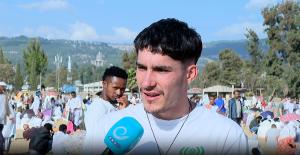
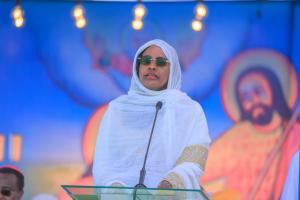
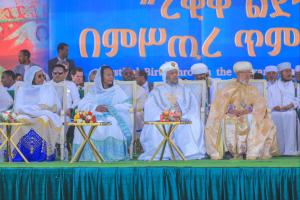
.jpg)





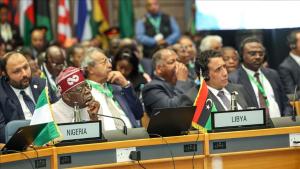
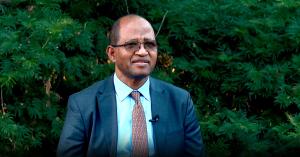

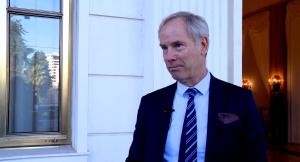

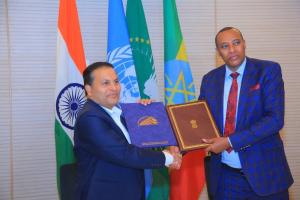

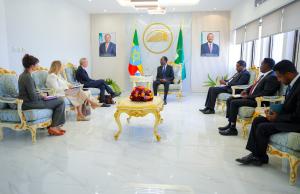
.jpg)
.jpg)

.jpg)
.jpg)
.jpg)
.jpg)


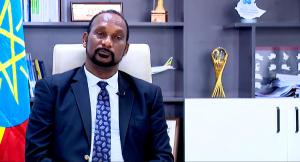
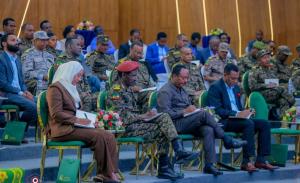
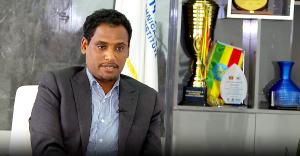




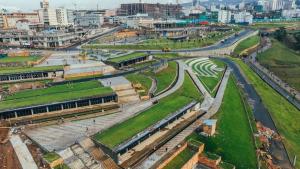
.jpg)
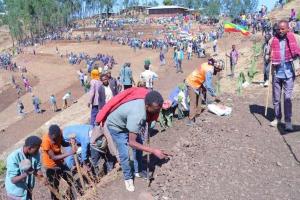

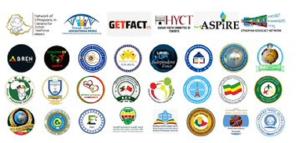

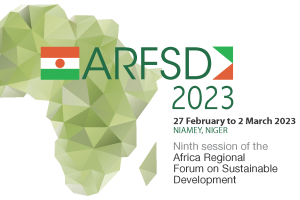
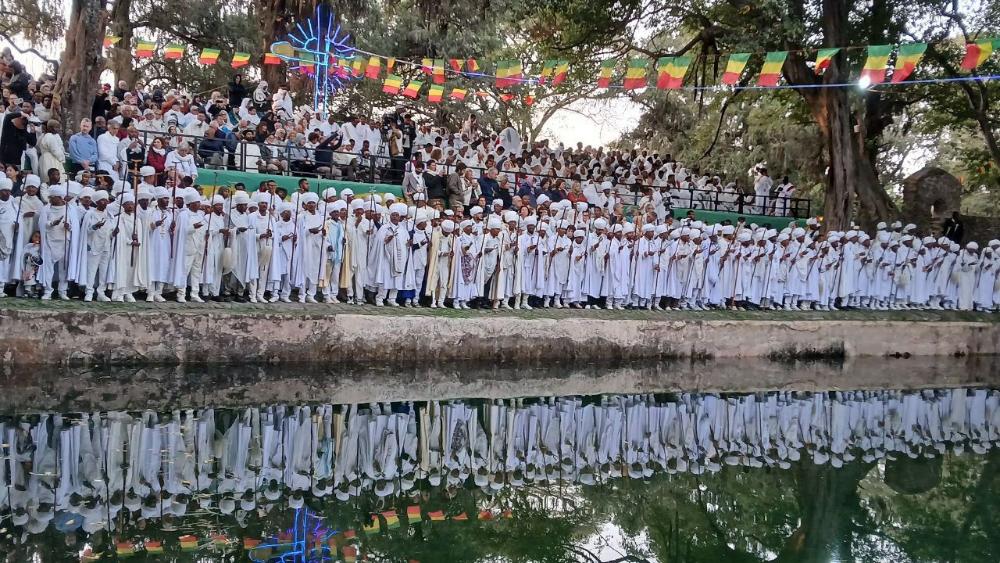
.jpeg)